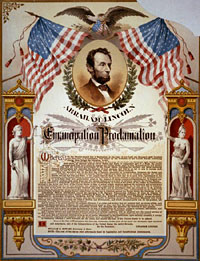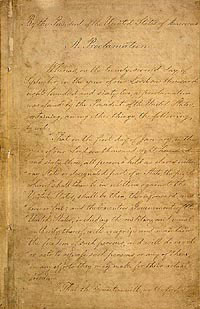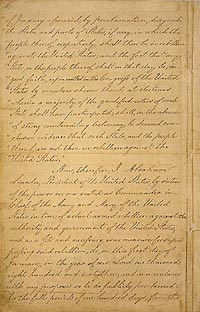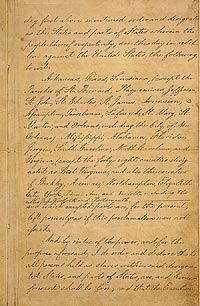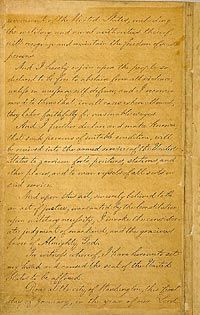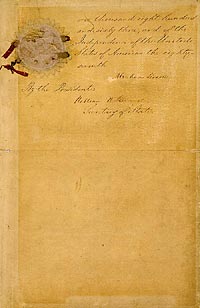The production of the Emancipation Proclamation took place in stages – as the president sought to balance pressure on him from pro-emancipation and anti-emancipation groups. For example, Senator Charles Sumner visited “White House twice on July 4 to plead that the President reconsecrate the day by a decree of emancipation, ” according to historian Allan Nevins. “The first time Lincoln protested that while he might take such a step for eastern Virginia, a proclamation for the entire South was ‘too big a lick now.’ Sumner replied that the nation needed big licks. The second time Lincoln offered a detailed argument for delay, as if he might be weakening.” 1
On July 12, 1862, President Lincoln had an unsuccessful meeting with representatives of Border States in an attempt to convince them that they should adopt a program of gradual, compensated emancipation. On July 13, Mr. Lincoln took a carriage ride with William Seward and Gideon Welles. Welles recorded in his diary: “It was on this occasion and on this ride that he first mentioned to Mr. Seward and myself the subject of emancipating the slaves by proclamation in case the Rebels did not cease to persist in their war on the Government and the Union, of which he saw no evidence. He dwelt earnestly on the gravity, importance, and delicacy of the movement, said he had given it much thought and had about come to the conclusion that it was a military necessity absolutely essential for the salvation of the Union, that we must free the slaves or be ourselves subdued, etc., etc.” 2
The next stage took place at a Cabinet meeting on July 22 at which President Lincoln revealed his plans to the rest of his cabinet members. According to Secretary of the Treasury Salmon Chase’s diary: “The question of arming slaves was then brought up and I advocated it warmly. The President was unwilling to adopt this measure, but proposed to issue a Proclamation, on the basis of the Confiscation Bill, calling upon the States to return to their allegiance – warning the rebels the provisions of the Act would have full force at the expiration of sixty days–adding, on his own part, a declaration of his intention to renew, at the next session of Congress, his recommendation of compensation to States adopting the gradual abolishment of slavery–and proclaiming the emancipation of all slaves within States remaining in insurrection on the first of January, 1863. I said that I should give to such a measure my cordial support, but I should prefer that no new expression on the subject of compensation should be made, and I thought that the measure of Emancipation could be much better and more quietly accomplished by allowing Generals to organize and arm the slaves (thus avoiding depredation and massacre on the one hand, and support to the insurrection on the other) and by directing the Commanders of Departments to proclaim emancipation within their Districts as soon as practicable; but I regarded this as so much better than inaction on the subject, that I should give it my entire support.” 3
President Lincoln made the decision. He did not look to the Cabinet for approval or rejection as he did on some other issues. He did take their advice on some tactical matters like the timing of the proclamation — which Secretary of State Seward thought should be postponed until the Union could boast of a major victory. On August 2, 1862 President Lincoln presented the Cabinet with the first draft of his proclamation, but he continued to conceal his intent from the country. Editor Horace Greeley published a “Prayer of Twenty Millions” calling for immediate emancipation; President Lincoln responded on August 22 that his “paramount object in this struggle is to save the union, and is not either to save or to destroy slavery.” 4 When a group of Chicago ministers met with him on September 13, he deflected their arguments for immediate emancipation but admitted he had not “decided against a proclamation of liberty to slaves.” 5 Artist Francis Carpenter, in early February 1864, heard President Lincoln explain his version history of the Proclamation which led up to a final cabinet meeting on September 20 after the Battle of Antietam:
“It had got to be,” said he, “midsummer, 1862. Things had gone on from bad to worse, until I felt that we had reached the end of our rope on the plan of operations we had been pursuing; that we had about played our last card, and must change our tactics, or lose the game! I now determined upon the adoption of the emancipation policy; and, without consultation with, or the knowledge of the Cabinet, I prepared the original draft of the proclamation, and, after much anxious thought, called a Cabinet meeting upon the subject. This was the last of July, or the first part of the month of August, 1862.” (The exact date he did not remember.) “This Cabinet meeting took place, I think, upon a Saturday. All were present, excepting Mr. Blair, the Postmaster-General, who was absent at the opening of the discussion, but came in subsequently. I said to the Cabinet that I had resolved upon this step, and had not called them together to ask their advice, but to lay the subject-matter of a proclamation before them; suggestions as to which would be in order, after they had heard it read….. Various suggestions were offered. Secretary Chase wished the language stronger in reference to the arming of the blacks. Mr. Blair, after he came in, deprecated the policy, on the ground that it would cost the Administration in the fall elections. Nothing, however, was offered that I had not already fully anticipated and settled in my own mind, until Secretary Seward spoke. He said in substance: “Mr. President, I approve of the proclamation, but I question the expediency of its issue at this juncture. The depression of the public mind, consequent upon our repeated reverses, is so great that I fear the effect of so important a step. It may be viewed as the last measure of an exhausted government, a cry for help; the government stretching forth its hands to Ethiopia stretching forth her hands to the government.” His idea,” said the President, “was that it would be considered our last shriek, on the retreat.” (This was his precise expression.) “Now,’ continued Mr. Seward, ‘while I approve the measure, I suggest, sir, that you postpone its issue, until you can give it to the country supported by military success, instead of issuing it, as would be the case now, upon the greatest disasters of the war!'” Mr. Lincoln continued: “The wisdom of the view of the Secretary of State struck me with very great force. It was an aspect of the case that, in all my thought upon the subject, I had entirely overlooked. The result was that I put the draft of the proclamation aside, as you do your sketch for a picture, waiting for a victory. From time to time I added or changed a line, touching it up here and there, anxiously watching the progress of events. Well, the next news we had was of Pope’s disaster, at Bull Run. Things looked darker than ever. Finally, came the week of the battle of Antietam. I determined to wait no longer. The news came, I think, on Wednesday, that the advantage as on our side. I was then staying at the Soldiers’ Home, (three miles out of Washington.) Here I finished writing the second draft of the preliminary proclamation; came up on Saturday; called the Cabinet together to hear it, and it was published the following Monday.”
At the final meeting of September 20th, another interesting incident occurred in connection with Secretary Seward. The President had written the important part of the proclamation in these words:—
“That, on the first day of January, in the year of our Lord one thousand eight hundred and sixty-three, all persons held as slaves within any State or designated part of a State, the people whereof shall then be in rebellion against the United States, shall be then, thenceforward, and forever FREE; and the Executive Government of the United States, including the military and naval authority thereof, will recognize the freedom of such persons, and will do no act or acts to repress such persons, or any of them, in any efforts they may make for their actual freedom.” “When I finished reading this paragraph,” resumed Mr. Lincoln, “Mr. Seward stopped me, and said, “I think, Mr. President, that you should insert after the word “recognize,” in that sentence, the words, “and maintain.”‘ I replied that I had already fully considered the import of that expression in this connection, but I had not introduced it, because it was not my way to promise what I was not entirely sure that I could perform, and I was not prepared to say that I thought we were exactly able to ‘maintain’ this.”
‘But,” said he, “Seward insisted that we ought to take this ground; and the words finally went in!”
“It is a somewhat remarkable fact,” he subsequently remarked, “that there were just one hundred days between the dates of the two proclamations issued upon the 22d of September and the 1st of January. I had not made the calculation at the time.”
Having concluded this interesting statement, the President then proceeded to show me the various positions occupied by himself and the different members of the Cabinet, on the occasion of the first meeting. “As nearly as I remember,” said he, “I sat near the head of the table; the Secretary of the Treasury and the Secretary of War were here, at my right hand; the others were grouped at the left.” 6
Beginning the cabinet meeting on September 22, 1862 on the Emancipation Proclamation, the President read from a book by Artemus Ward: “In the Faul of 1856, I showed my show in Utky, a trooly grate sitty in the State of New York. 1 Day as I was givin a descripshun of my Beests and Snaiks in my usual flowery stile what was my skorn & Disgust to see a big burly feller walk up to the cage containin my wax figgers of the Lord’s Last Supper, and cease Judas Iscarrot by the feete and drag him out on the grond. He then commenced fur to pound him as hard as he cood.” 7 Although Postmaster General Montgomery Blair urged that action be postponed until after the fall congressional elections, President Lincoln later maintained that “No member of the Cabinet ever dissented from the policy, in any conversation with me.” 8 Secretary of the Navy Gideon Welles recorded his version of that Cabinet meeting at which the final decision on the proclamation was made:
The subject was the Proclamation for emancipating the slaves after a certain date, in States that shall then be in rebellion. For several weeks the subject has been suspended, but the President says never lost sight of. When it was submitted, and now in taking up the Proclamation, the President stated the question was finally decided, the act and the consequences were his, but that he felt it due to us to make us acquainted with the fact and to invite criticism on the paper which he had prepared. There were, he had found, not unexpectedly, some difference in the Cabinet, but he had, after ascertaining in his own way the views of each and all, individually and collectively, formed his own conclusions and made his own decisions. In the course of the discussion on this paper, which was long, earnest, on the discussion on this paper, which was long, earnest, and on the general principle involved, harmonious, he remarked that he had made a vow, a covenant, that if God gave up the victory in the approaching battle, he would consider it an indication of Divine will, and that it was his duty to move forward in the cause of emancipation. It might be thought strange, he said, that he had in this way submitted the disposal of matters when the way was not clear to his mind what he should do. God had decided this question in favor of the slaves. He was satisfied it was right, was confirmed and strengthened in his action by the vow and the results. His mind was fixed, his decision made, but he wished his paper announcing his course as correct in terms as it could be made without any change in his determination. He read the comment. One or two unimportant amendments suggested by Seward were approved. It was then handed to the Secretary of State to publish to-morrow. After this, [Postmaster General Montgomery] Blair remarked that he considered it proper to say he did not concur in the expediency of the measure at this time, though he approved of the principle, and should therefore wish to file his objections. He stated at some length his views, which [were] substantially that we ought not to put in greater jeopardy the patriotic element in the Border States, that the results of the Proclamation would be to carry over those States en masse to the Secessionists as soon as it was read, and that there was also a class of partisans in the Free States endeavoring to revive old parties, who would have a club put into their hands of which they would avail themselves to beat the Administration.
The President said he had considered the danger to be apprehended from the first objection, which was undoubtedly serious, but the objection was certainly as great not to act; as regarded the last, it had not much weight with him.
The question of power, authority, in the Government to set free the slaves was not much discussed at this meeting, but had been canvassed by the President in a private conversation with the members individually. Some thought legislation advisable before the step was taken, but Congress was clothed with no authority on this subject, nor is the Executive, except under the war power,–military necessity, martial law, when there can be no legislation. This was the view which I took when the President first presented the subject to Seward and myself last summer as we were returning from the funeral of Stanton’s child,–a ride of two or three miles from beyond Georgetown. Seward was at that time not at all communicative, and, I think, not willing to advise, thought he did not dissent from, the movement. It is momentous both in its immediate and remote resolute, and an exercise of extraordinary power which cannot be justified on mere humanitarian principles, and would never have been attempted but to preserve the national existence. The slaves must be with us or against us in the War. Let us have them. These were my convictions and this the drift of the discussion.
The effect which the Proclamation will have on the public mind is a matter of some uncertainty. In some respects it would, I think, have been better to have issued it when formerly first considered.
There is an impression that Seward has opposed, and is opposed to, the measure. I have not been without that impression myself, chiefly from his hesitation to commit himself, and perhaps because action was suspended on his suggestion.
But in the final discussion he has as cordially supported the measure as Chase. 9
The President’s Proclamation did not meet with universal acceptance, even among his own appointees. George McClellan, commander of the Army of the Potomac, was furious and had a hard time restraining his criticism. On September 26, McClellan wrote a friend: I am very anxious to know how you and men like you regard the recent Proclamations of the Presdt inaugurating servile war, emancipating the slaves, & at one stroke of the pen changing our free institutions into a despotism – for such I regard as the natural effect of the last Proclamation suspending the habeas Corpus throughout the land.” 10
Shortly after the public announcement, Edward Stanly, military governor of North Carolina, left his post to come to Washington to protest. He later related to journalist James Welling his conversations with the President, which Welling in turn recorded in his diary of September 27, 1862: “Mr. Stanly said that the President had stated to him that the proclamation had become a civil necessity to prevent the Radicals from openly embarrassing the government in the conduct of the war. The President expressed the belief that, without the proclamation for which they had been clamoring, the Radicals would take the extreme step in Congress of withholding supplies for carrying on the war – leaving the whole land in anarchy. Mr. Lincoln said that he had prayed to the Almighty to save him from this necessity, adopting the very language of our Saviour, ‘If it be possible, let this cup pass from me,’ but the prayer had not been answered.” 11
Other cabinet meetings were held at the end of December 1862 at which the final wording of the Proclamation was discussed. According to Welles’ Diary entry of December 31, “We had an early and special Cabinet-meeting, convened at 10 A.M. The subject was the Proclamation of to-morrow to emancipate the slaves in Rebel States. Seward proposed two amendments, – one including mine, and one enjoining upon, instead of appealing to, those emancipated, to forbear from tumult. Blair had, like Seward and myself, proposed the omission of a part of sentence and made other suggestions which I thought improvements. Chase made some good criticisms and proposed a felicitous closing sentence. The President took the suggestions, written in order, and said he would complete the document.” 12
“Thursday, January 1, 1863, was a bright crisp day in the nation’s capital. The previous day had been a strenuous one for the President, but New Year’s Day was to be even more strenuous. So he rose early. There was much to do, not the least of which was to put the finishing touches on the Proclamation. Before he could begin, the troubled General Ambrose E. Burnside, who had led the ill-fated Fredericksburg campaign, called at the White House,” wrote historian John Hope Franklin. 13 Burnside thought he should be relieved of command – and that General-in-Chief Henry Halleck and Secretary of War Edwin Stanton should be as well. It was a major distraction that required all of the President’s diplomatic powers.
President Lincoln completed work on the Emancipation Proclamation in his office and then sent it to the State Department for its official calligraphy. It was brought to his office at 10:45 in the morning and signed by the President. But he did not like the superscription which read: In testimony whereof I have hereunto set my name and caused the seal of the United States to be affixed.” The President preferred “hand” to “name” and asked Secretary of State William Seward to prepare a new copy for his signature.
The levee started at 11 A.M. His secretaries, John Nicolay and John Hay later wrote: “Had actual necessity required it, he could of course had left such mere social occupation at any moment; but the president saw no occasion for precipitancy. On the other hand, he probably deemed it wise that the completion of this momentous executive act should be attended by every circumstance of deliberation.” 14
After the New Year’s levee downstairs in late morning and early afternoon, he returned to his office where he signed the Emancipation Proclamation with a strong but slightly shaking hand. “Now this signature is one that will be closely examined. If they find my hand trembled they will say, ‘he had some compunctions.’ Later that day he told Schuyler Colfax that three hours’ hand-shaking is not calculated to improve a man’s chirography.” According to the President, “The South had fair warning, that if they did not return to their duty, I should strike at this pillar of their strength. The promise must now be kept, and I shall never recall one word.” 15
Before the official seal was affixed to the proclamation, Secretary of State William Seward also signed the Proclamation. Seward’s son Frederick preserved his recollections of the event:
At noon, accompanying my father, I carried the broad parchment in a large portfolio under my arm. We, threading our way through the throng in the vicinity of the White House, went upstairs to the President’s room, where Mr. Lincoln speedily joined us. The broad sheet was spread open before him on the Cabinet table. Mr. Lincoln dipped his pen in the ink, and then, holding it a moment above the sheet, seemed to hesitate. Looking around, he said:
“I never in my life felt more certain that I was doing right, than I do in signing this paper. But I have been receiving calls and shaking hands since nine o’clock this morning, till my arm is stiff and numb. Now this signature is one that will be closely examined, and if they find my hand trembled they will say ‘he had some compunctions.’ But anyway, it is going to be done.”
So saying, he slowly and carefully wrote his name at the bottom of the proclamation. The signature proved to be unusually clear, bold, and firm, even for him, and a laugh followed at his apprehension. My father, after appending his own name, and causing the great seal to be affixed, had the important document placed among the archives. Copies were at once given to the press.16
Across the hall in John Hay’s office, William O. Stoddard was working. “Stod, the President wants you to make two copies of this right away. I must go back to him,” said John Hay, interrupting him. Stoddard later wrote: “I took the paper and some fresh sheets and went at it mechanically in the ordinary course of business. As I went on, however, from sentence to sentence, word to word, I wrote more slowly and with a queer tremor shaking my nerves. Then I looked up from my work and listened, for far away, nearer, nearer, I could hear the sound of clanking iron, as of breaking and falling chains, and after that the shouts of a great multitude, the laughter and songs of the newly free, and the anger of the fierce opposition, wrath, fury, dismay. For I was writing the first copies from Abraham Lincoln’s own draft of the January 1, 1863, Emancipation Proclamation.” 17
That might have been enough for one hard day’s work but President Lincoln had other problems that day. He had to meet with Secretary of War Edwin M. Stanton, General Ambrose Burnside and General-in-Chief Henry W. Halleck. Burnside’s problems with the Army of the Potomac were so severe that he presented his resignation and suggested that Halleck and Stanton should too. Halleck was sufficiently insulted that he also wrote out his resignation.
On January 25, President Lincoln spoke to an abolitionist delegation and admitted that he had “not expected much from it at first anc consequently had not been disappointed. He had hoped, and still hoped, that something would come of it after a while.” He added that he was “convinced that his administration would not have been supported by the country at any earlier stage of the war in a policy of emancipation.” Nevertheless, said the President, “I believe the Proclamation has knocked the bottom out of slavery, though at no time have I expected any sudden results from it.” 18
Footnotes
- Allen Nevins, The War for the Union: War Becomes Revolution, 1862-1863, p.147
- Diary of Gideon Welles, Volume I, p. 70-71
- Chase, Inside the Cabinet, p. 97-100.
- Roy M. Basler, editor, Collected Works of Abraham Lincoln, Volume V, p. 388.
- Francis Carpenter, Six Months at the White House, p. 20-24.
- Margaret Leech, Reveille in Washington, p. 289.
- Carpenter, p. 88.
- Welles, Volume I, p. 142-144.
- Letter to William H. Aspinwall, in Stephen Sears, editor, Civil War Papers of George B. McClellan, p. 481.
- Allen Thorndike Rice, editor, Reminiscences of Abraham Lincoln, p. 533.
- Welles, Volume I, p. 210-211.
- John Hope Franklin, The Emancipation Proclamation, p. 88.
- John Hay and John G. Nicolay, Abraham Lincoln, Volume VI, p. 429
- Francis Carpenter, Six Months in the White House, p. 87.
- Frederick Seward, Reminiscences of a War-time Statesman and Diplomat, p. 227.
- William O. Stoddard, Jr., editor, Lincoln’s Third Secretary, p. 169-170.
- Don E. Fehrenbacher and Virginia Fehrenbacher, editors, Recollected Words of Abraham Lincoln, p. 120.
Visit
William H. Seward
Gideon Welles
Salmon P. Chase
Edwin M. Stanton
George B. McClellan
Ambrose E. Burnside
Henry W. Halleck

